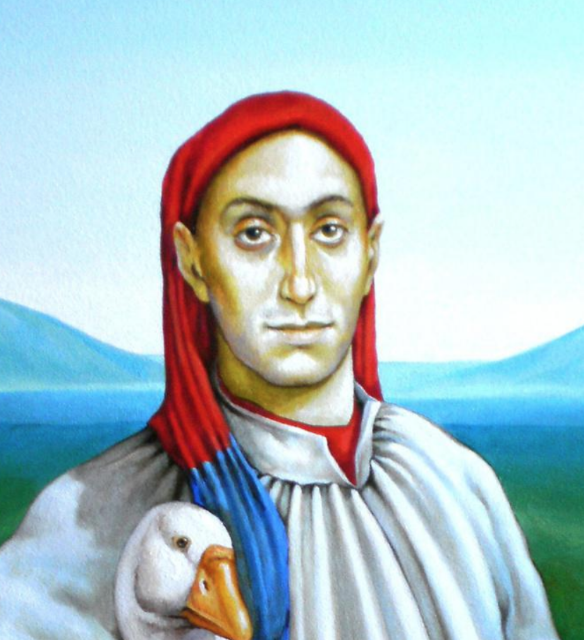Under his wings
- Goslings in Decameron
The novella of the gosling with the father, Filippo Balducci, and his son is the only one in the whole of the Decameron in which the narrative voice of the Author himself intervenes instead of letting one member of the merry brigade (the group of ten youngsters) tell this story. The aim is to show that the forces of nature, in this case erotic attraction, are irresistible and, moreover, completly natural (the basic concept of Boccaccio’s philosophy of (carnal) love). This novella is said to be used by Boccaccio to defend himself from all the negative critiques on the novellas written thus far, ergo to justify his reasons why he has written the Decameron by using the novella of the goslings.
The novella of the gosling with the father, Filippo Balducci, and his son is the only one in the whole of the Decameron in which the narrative voice of the Author himself intervenes instead of letting one member of the merry brigade (the group of ten youngsters) tell this story. The aim is to show that the forces of nature, in this case erotic attraction, are irresistible and, moreover, completly natural (the basic concept of Boccaccio’s philosophy of (carnal) love). This novella is said to be used by Boccaccio to defend himself from all the negative critiques on the novellas written thus far, ergo to justify his reasons why he has written the Decameron by using the novella of the goslings.
The use of metaphors like “imbeccare” (which refers to a sexual act) are expressions taken from everyday medieval reality to add a comical touch to the story. In this case the expression used in the context of the novella is to demean women and to underrate love in general (Balducci). This is not the case however, because in this formal defence, we can see how the Author justifies the choice of the use of erotic terms, because these terms also appear in fables and novellas already present in classical literature, thus denouncing the “low level” of the text he is criticized for. The same arguments are offered to defend the use of the Florentine “volgare”, and not the more erudite Latin. The Decameron represents a mix of happiness and tragedy written for women, as told by the Author in the introduction of the book. He also declares his high esteem for women using terms like ‘women are muses, but made from flesh and blood’. At one point, Boccaccio states (Italian in the video):
_Others, affecting to deliver a more considered judgment, have said that it ill befits my time of life to ensue such matters, to wit, the discoursing of women, or endeavouring to pleasure them. And not a few, feigning a mighty tender regard to my fame, aver that I should do more wisely to keep ever with the Muses on Parnassus, than to forgather with you in such vain dalliance.
To keep with the Muses on Parnassus is counsel I approve; but tarry with them always we cannot, nor they with us, nor is a man blameworthy, if, when he happen to part from them, he find his delight in those that resemble them. The Muses are ladies, and albeit ladies are not the peers of the Muses, yet they have their outward semblance; for which cause, if for no other, 'tis reasonable that I should be fond of them. Besides which, ladies have been to me the occasion of composing some thousand verses, but of never a verse that I made were the Muses the occasion.
Therefore, the Decameron could be seen as a new and very important literary form with its rhetorical skills and the choice of writing for a feminine audience which was highly undervalued in medieval society.
